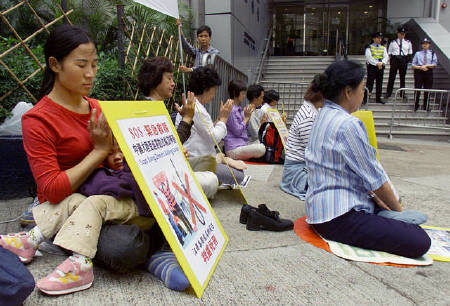Reuters: Falun Gong [uses] TV broadcasts to spread message (photo)
Fri May 10, 2002
BEIJING (Reuters) - Defiant members of the banned Falun Gong spiritual group [tapped into] the airwaves of a second northeastern Chinese city in April to show footage protesting against a government crackdown on their faith, witnesses said on Friday.

Falun Gong practitioners hold a meditation protest outside a police station in Hong Kong in March. REUTERS/Bobby Yip
Images touting the virtues of Falun Gong were broadcast on thousands of television sets in a district of the industrial hub of Harbin on the night of April 21, a TV repairman told Reuters.
"I heard it went on for about five minutes," said the worker in Harbin, capital of Heilongjiang province which borders Russia. "Other sub-districts in the city were not affected."
A local broadcast bureau official confirmed the incident had taken place but would give no details. Police and government officials declined comment.
The move was the latest in a string of high profile attempts by Falun Gong to try and convince the public that adherents suffer wrongful persecution by a Communist government which is trying to crush it.
Falun Gong [tapped] into a cable television broadcast in the northeastern city of Changchun on March 5 to show a similar film.
The airings have been among the group's most daring actions since it was banned in 1999 [...].
"EVOLVING METHODS"
[...] The New York-based Falun Dafa Information Centre said earlier in a statement the group had [tapped into] the airways of large Chinese cable networks five times in the past three months. This could not be independently verified.
Police have arrested more than 20 Falun Gong members for the March 5 incident. They could face prison terms of up to 15 years, according to Chinese officials.
The New York centre also said that Falun Gong's methods of trying to bring an end to persecution in China were evolving but the message remained the same.
"No longer appealing just in Beijing, practitioners and supporters of Falun Gong clarify the truth about the persecution on thousands of street corners, sign-posts, highway overpasses and increasingly, on millions of televisions throughout China," it said.
China's campaign against Falun Gong has drawn sharp criticism from some U.S. rights groups who maintain the International Olympic Committee overlooked human rights considerations in the world's most populous country.
Some rights groups hope the 2008 Beijing Olympics will encourage greater scrutiny of China's rights record and be a catalyst for change for the better.
http://story.news.yahoo.com/news?tmpl=story&u=/nm/20020510/wl_asia_nm/asi a_104347_1